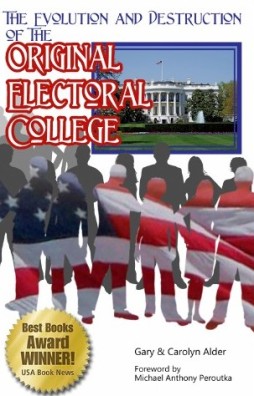Sore Losers–The Framers didn’t want us to play this game
by Carolyn Alder – Nov. 28, 2016
The game ended over two weeks ago and yet the losers are still pouting, protesting, rioting, vandalizing, suspending college classes, threatening to secede, petitioning the Presidential Electors to vote for Hillary on Dec. 19th, and planning to flood down on Washington D.C with protests on Jan. 20th, 2017.
This is not just a game lost; but a war that has been going on over a year to capture the “White House.” The battleground states became a battleground nation. Mr. Trump won the Electoral College battle, Mrs. Clinton won the popular vote battle; but who will win the war on Jan. 20th?
It won’t be the Constitution or the American Federation the Framers established.
Were Hillary Clinton and Donald Trump the most outstanding individuals and statesmen this nation could produce? This ludicrous and shameful behavior is what party politics and mass democracy has done to us.
Doesn’t this election cycle, if nothing else, prove that we need a better way to elect this high office?
The Framers did not want a democracy. They rejected the idea of a popular vote to elect the President. The notes from the Constitutional Convention, describe many options that were discussed at length on several occasions as to how the office of the chief Executive, the President of the Union of States should be chosen. To share a couple example of their objection to a popular election:
“ Mr. GERRY. (Elbridge Gerry, MA) A popular election in this case is radically vicious [violent]. The ignorance of the people would put it in the power of some one set of men dispersed through the Union & acting in Concert to delude them into any appointment.” [1]
Mr. Gerry also spoke of the “excesses” and “evils” of democracy expressing his opposition this way, “The evils we experience flow from the excess of democracy. The people do not want [lack] virtue, but are the dupes of pretended patriots. In Mass. it had been fully confirmed by experience that they are daily misled into the most baneful measures and opinions by the false reports circulated by designing men, and which no one on the spot can refute.” [2]
Col George Mason delegate from Virginia, also known as the father of the Bill of Rights, put it this way, “It would be as unnatural to refer the choice of a proper character for chief Magistrate to the people, as it would to refer a trial of colours to a blind man.” [3]
Roger Sherman of Connecticut said, “that the president ought to be elected by Congress, since he feared that direct election of presidents by the people would lead to the creation of a monarchy.” [4]
If the Framers did not want a popularly elected president or democracy –what did they want?
They wanted to design a structure of government to control the national level of government, safeguard freedom, protect individual liberty, establish justice and promote prosperity. They did not go from a confederation of states to a consolidated central government.
The Framers intelligently designed the greatest political document ever created–the Constitution of the United States. It defined a modified American Federation; a “more perfect Union”–not a democracy. The Constitution added one house (but only one house) to be elected by the people. The Articles of Confederation had no assembly elected by the people.
They also added an Executive Branch with specific limited responsibilities and a detailed method for filling that office. Article II of the Constitution carefully outlines every step. It was a compound process using one group outside of government influence (independent Presidential Electors) to recommend the most outstanding presidential possibilities; and a second group inside government (the House of Representatives) to make the final election by the States, each state having one vote.
The concept of having one body nominate a group of candidates from which another body will make a final selection is consistent with Resolution #5 of the Virginia Plan and not an uncommon practice. [5]
Both the nomination and the election came under the jurisdiction of the States. The States would choose the method of appointment of the Electors and the States having an equal voice—one vote each, would elect the President. (An American Federation again.)
A “short cut” was provided in case a majority of Electors recommended the same individuals; then there was no need to go to the House. For a more detailed examination of the presidential election process see: A Far Superior Process [6]
Some of the delegates in the Convention thought the Congress would often make the final election. George Mason for example, stated “that nineteen times in twenty the President would be chosen by the Senate, an improper body for the purpose.” However, on Sept. 4th when the final election was changed from the Senate to the House, it pleased many delegates. Mr. Madison records: “Col: Mason liked the latter mode best as lessening the aristocratic influence of the Senate.” [7]
However, because political party machinations sought to manipulate and control the Presidential Electors, and always force a majority, we soon lost the independence of the Electors and the Executive Branch. The first Branch to fall victim to party politics and democracy was the Executive, facilitated by the 12th Amendment. The Senate was the second casualty of party control and democracy with the 17th Amendment. The State’s lost the voice of their State Government and the American Federation crumbled to the ground.
President George Washington in his farewell address earnestly pleaded and warned the country in the most solemn manner not to resort to political parties; that sooner or later, the despotism and spirit of revenge would result in the ruins of Public Liberty. (Sept. 19, 1796)
We claim that constitutional government was destroyed by party government. See our book: The Evolution and Destruction of the Original Electoral College
The Constitution was intelligently designed to control the government, not to control the people.
However, the Constitution does not have any control over party politics, but party politics has a lot of control over the people and the government.
Footnotes
[1] http://userpages.umbc.edu/~bouton/History101/ConstitutionalConvention.htm
[2] United States—Formation of the Union Documents Illustrative of the Union of the American States p.125 http://archive.org/details/documentsillustr00libr
[3] Jul 17, 1787 United States—Formation of the Union pg.127 http://archive.org/details/documentsillustr00libr
[4] http://www.washingtonpost.com/posteverything/wp/2016/11/15/in-defense-of-the-electoral-college/?utm_term=.e160bfe685e2
[5] May 31st, 1787 United States—Formation of the Union p.127 http://archive.org/details/documentsillustr00libr
[6] http://noisyroom.net/blog/2016/03/03/if-your-nominating-process-resembles-a-circus-you-get-clowns-in-the-white-house-the-framers-designed-a-far-superior-process-the-original-electoral-college/
[7] United States—Formation of the Union p. 678 http://archive.org/details/documentsillustr00libr


